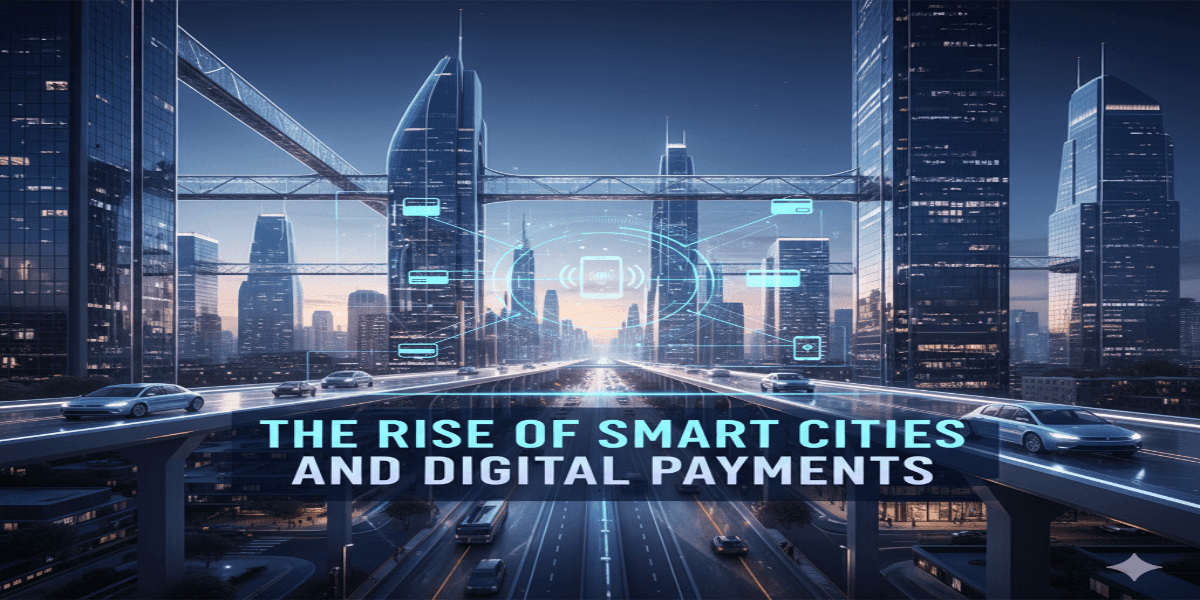The Rise of Smart Cities and Digital Payments:
The Rise of Smart Cities and Digital Payments:
Cities all around the world are changing quickly to adapt to the needs of a world that is dominated by digital technology. The idea of smart cities—urban regions that combine data, technology, and sustainable infrastructure—is becoming more and more popular in the US. The rise of digital payments is also changing the economic relationships between governments, corporations, and citizens. A new urban reality—connected, cashless, and digitally empowered cities—is being ushered in by these trends taken together.
HSBC Cashback Credit Card 2025 – Benefits, Rewards & How to Apply?

A Smart City: What Is It?
A smart city is more than just a place with fast internet or digital apps. It is an interconnected ecosystem where technology and data enhance efficiency, improve sustainability, and elevate the quality of life. Key features include:
- Smart Infrastructure – IoT sensors, AI-powered systems, and energy-efficient grids.
- Digital Governance – E-services for citizens, smart administration, and transparent policies.
- Sustainable Energy Solutions – Solar power, electric vehicles (EVs), and eco-friendly transport.
- Smart Mobility – Ride-sharing, AI-driven traffic control, and connected public transportation.
- Citizen Engagement – Digital platforms for public participation and decision-making.
In essence, smart cities are designed to leverage technology for better governance, sustainability, and inclusivity.
Digital Payments: Smart Cities’ Lifeblood
Digital-first, cashless technologies are replacing old payment methods as cities get smarter. Digital payments have emerged as a key component of urban development, ranging from contactless cards to mobile wallets and biometric transactions.
Digital Payment Types Fueling the Shift:
- Mobile Wallets (Apple Pay, Google Pay, Samsung Pay)
- Contactless Cards
- Peer-to-Peer (P2P) Apps (Venmo, Cash App, Zelle)
- Cryptocurrency Payments (Bitcoin, Ethereum)
- QR Code Transactions
- Biometric Payments (fingerprint or facial recognition-based)
In smart cities, digital payments go beyond shopping. They are integrated into public transportation systems, parking, government services, and even energy consumption tracking.
The US Smart City Movement
The U.S. is witnessing a rapid adoption of smart city initiatives, led by technology hubs and urban centers. Cities like New York, San Francisco, Chicago, and Austin are investing in IoT infrastructure, smart traffic systems, and digital payment integration.
According to recent studies, over 26 major U.S. cities have launched smart city programs focusing on areas such as transportation, security, energy, and digital inclusion. The pandemic accelerated these changes as cashless transactions became essential for safety and convenience.
Benefits of Smart Cities and Digital Payments
Speed and Convenience
Cashless payments streamline daily transactions—from paying bus fares to buying groceries—saving time for citizens and businesses alike.
Economic Growth
Digital transactions reduce the shadow economy and open new avenues for fintech innovation, job creation, and investment.
Improved Governance
Smart payment systems allow governments to collect taxes, fees, and fines efficiently, improving transparency and reducing corruption.
Sustainability
With digital solutions, cities can reduce paper use, cut energy waste, and encourage eco-friendly transport options.
Safety and Security
Smart surveillance and digital payment systems help track fraud, prevent theft, and improve urban safety.
Challenges in Building Smart, Cashless Cities
- Cybersecurity Risks – Digital systems are vulnerable to hacking and fraud.
- Privacy Concerns – Citizens worry about surveillance and misuse of data.
- Digital Divide – Not all residents have equal access to smartphones, internet, or financial services.
- Regulatory Barriers – Fragmented policies may slow down smart city adoption.
- High Costs – Infrastructure development requires billions in funding and long-term planning.
The Role of Technology in Urban Payments
AI, or artificial intelligence
AI is central to managing traffic flow, predictive policing, smart energy grids, and fraud detection in digital payments.
Internet of Things (IoT)
Connected devices—from streetlights to smart meters—integrate with payment systems for seamless automation.
Blockchain
Blockchain ensures secure, transparent, and tamper-proof digital transactions, paving the way for decentralized urban economies.
5G Networks
The rollout of 5G will enable faster, real-time communication between millions of connected devices, fueling the next wave of smart city services.
Why America Must Take the Lead in the Revolution of Smart Cities
The creation of smart cities is no exception to the U.S.’s longstanding leadership in technical innovation. The United States needs to increase its investments in digital infrastructure, cybersecurity, and inclusion in order to stay ahead of nations like China, Singapore, and the United Arab Emirates.
Public-private collaborations, community involvement, and a dedication to closing the digital divide will be necessary for a smooth transition and allow all citizens to take part in the cashless, connected future.
In Conclusion
The emergence of digital payments and smart cities represents a paradigm shift in how Americans communicate, work, and live. The United States is becoming a network of smarter, safer, and more sustainable cities as a result of the integration of technology into urban life, from cashless transportation to AI-powered governance.
Even though there are still issues with security, privacy, and inclusivity, the advantages of this change greatly exceed the disadvantages. The future of urban America will be shaped by smart cities and digital payments with the correct investments and policies, guaranteeing that technology is a vehicle for innovation, equity, and progress.
Should Freelancers Form an LLC? Benefits, Risks, and Expert Insights
Should Freelancers Form an LLC? Benefits, Risks, and Expert Insights
